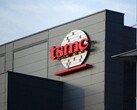After announcing that the President Trump administration's tariffs on chip imports could jeopardize its $165 billion investment in a 2nm/3nm process foundry in Arizona, TSMC may now be on the hook for an even larger commitment.
According to Trump, TSMC will invest no less than $300 billion in the US now, which is nearly double its previous commitments, yet not enough to execute the rumored buyout of Intel that US authorities were allegedly forcing it into.
Famed industry analyst Ming-Chi Kuo, who is actually based in Taiwan, and correctly predicted the A18 Pro chipset in the iPhone 16 Pro Max, confirms that there have been talks about TSMC buying Intel indeed, but the US didn't proceed with its request as it realized the true scope of challenges that Intel faces.
Instead, TSMC would now have to invest up to $300 billion in its Arizona foundry production facilities, it seems. The investments it has announced there amounted to $165 billion so far, but even then it could only supply about 7% of modern chips that US companies like Apple would actually need, according to Treasury Secretary Scott Bessent.
That number is expected to rise significantly if TSMC indeed committed $300 billion of direct investment in the US to escape the 20% tariff on semiconductors coming out of its Taiwanese foundries, expected to be announced next week. If the White House administration had indeed demanded that TSMC buy Intel on top of that commitment, the chip maker would've had to invest the staggering $565 billion in the US, which is highly unlikely.
Given Trump's modus operandi, continues Kuo, the most probable outcome is that TSMC negotiates its tariff ransom and investment request down from an initial exorbitant amount declared as a starting point in negotiations.
Still, TSMC plans a very significant outlay in Arizona, aiming to ship at least 30% of its global 2nm manufacturing process production out of the US and manufacture even more advanced nodes there in the future. TSMC is not buying Intel, though, despite that the foundry is a big part of the US trade negotiations with Taiwan.
Source(s)
FocusTaiwan via Ming-Chi Kuo (X)





















